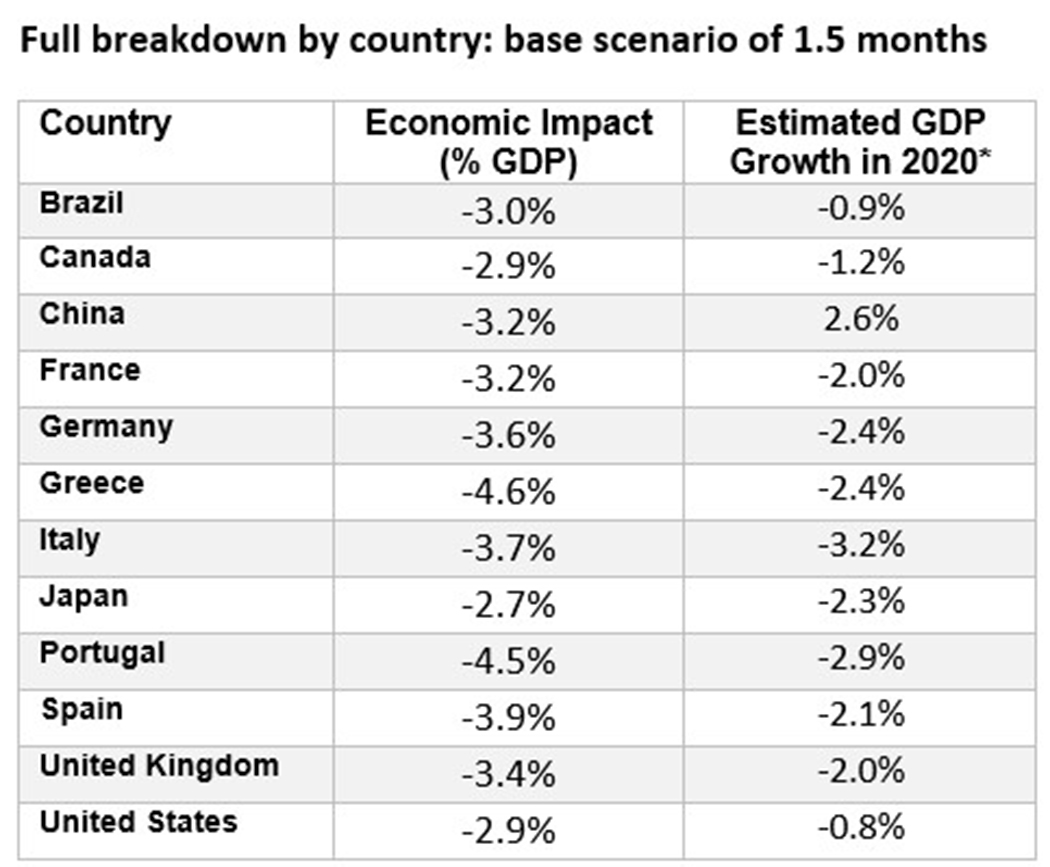
IESE Insight
How much will COVID-19 shake the world economy?
"The potential impacts of the coronavirus crisis are larger than any previously seen in history," warns Nuno Fernandes in a new report. The economies of Greece, Italy, Portugal and Spain are predicted to be among the most affected.
- The economic effects of the novel coronavirus outbreak are currently being underestimated due to overreliance on historical comparisons.
- GDP growth to take a hit ranging from 3% to 5%, depending on the country, in estimates based on a mild scenario in which shutdowns last for 1.5 months.
- Every extra month of shutdown wipes out approximately 2% to 2.5% of global GDP growth.
COVID-19 is likely to send the world into recession, because of its blow to both supply and demand, its global reach and its origin in economic powerhouse China. That is according to a report released on March 23, 2020, by professor Nuno Fernandes. "A global recession now seems inevitable," he concludes.
Fernandes notes that how deep and long the downturn will be depends on many factors, in addition to the length of current lockdowns. Those include the success of measures to prevent the spread of COVID-19, along with the effects of government policies to alleviate liquidity problems in SMEs, to support families under financial distress, and to secure jobs.
"There is still time for global policymakers to have a coordinated policy response to the virus and its economic impacts," Fernandes writes. "However, time is running out."
The severity of the recession will also depend on how companies react and how quickly supply chains can be restored, the report says.
Historical comparisons difficult
In making its GDP forecasts, the report shows why simple historical comparisons with crises such as SARs or the 2008/9 financial meltdown are not applicable.
Unlike with previous crises, Fernandes points out that "this time, we are facing a combined supply and demand shock" exacerbated by a variety of factors, such as the highly integrated nature of the world economy and the key role that China, the center of the initial outbreak, now plays in it.
The global pandemic has also come at a time when interest rates are extremely low, and monetary tools to combat the crisis are limited. "Central banks exhausted their firepower during the good times. There is almost no room for monetary stimulus to help sustain the coming risks," he warns.
Taking into account this context, the report discusses how the economic impact of the coronavirus outbreak is being felt across different industries and countries. For example:
- Service-oriented economies will be particularly negatively affected, and have more jobs at risk.
- Countries like Greece, Portugal, and Spain that are more reliant on tourism (more than 15% of GDP) will be more affected by this crisis.
- Countries more reliant on exports will suffer disproportionally.
GDP estimates based on three scenarios
The report also attempts a rough estimate of the potential global economic costs of COVID-19 under three different scenarios: a shutdown of 1.5 months (from mid-March to end of April), of 3 months (lasting until mid-June), and of 4.5 months (until end of July).
In a mild scenario (a shutdown of economic activity is assumed to last 1.5 months, from mid-March to end- of April):
- Overall, for all countries analyzed, an average impact of -3.5% of GDP is expected.
- The U.S. is expected to enter into a recession, with a downturn in GDP of 0.8%. Overall, the crisis is expected to cost it nearly 3% of its GDP.
- Most European countries will face significant recessions, seeing contractions of their GDP of 2% to 3%. Judging from prior recessio
ns, a decline in GDP of this magnitude will significantly increase unemployment. - In this scenario, nearly all countries analyzed will experience negative GDP growth, apart from China (although its growth will still be slashed from a pre-crisis estimate of 6% to below 3%).

*Expected GDP growth takes into account the (pre-crisis) expected 2020 GDP growth for each country and the economic costs of the COVID-19 crisis
Source: "Economic effects of coronavirus outbreak (COVID-19) on the world economy" by Nuno Fernandes.
If crisis measures are extended:
- On average, each additional month of shutdowns will cost 2% to 2.5% of global GDP.
- If extreme COVID-19-related measures last until mid-June 2020, the U.S. will see its GDP fall almost 4%. Italy and Germany will see their GDP fall close to 6% and the UK more than 5%.
- If it lasts until the end of July 2020, the average decline in GDP would be close to 8%. And the decrease in GDP could, in some cases, be higher than 10%.
According to Fernandes, "If the ongoing crisis lasts until the end of the summer, the global economy faces the gravest threat seen in the last two centuries."
